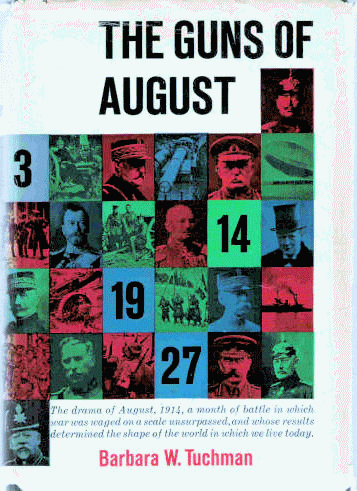
We are about to run out of cute literary asides to great works of the past as the future sweeps over us. Along with all the other scribblers about these great matters, I am looking for the next hackneyed line to use.
Old Jim had some words for me in that regard as we relaxed in the late summer sunlight at Willow yesterday. “Write, Goddamn it.”
“I still have two days,” I responded, sipping my white wine a little defensively.
“That is not what I meant. Lecture done. I am going to the can.” He grabbed his bulldog-headed cane and stomped off for the men’s room.
My old pal on my right grimaced. We try to stay in touch from our days in the Secret Squirrel world of the intelligence budget was avoiding any comment on the latest Snowden leaks. So the collision of the present and the past seemed to offer some safe ground.
“So,” I said, “Let me say this: Barbara Tuchman’s seminal work- is an amazing thing. It was published in 1962, or just about halfway between then and now.”
My pal nodded, and we went on to discuss other things. I wound up thinking about it again this morning, as I absorbed the news that the Brits were not going to get dragged into another WMD-related discretionary war.
Smart move. I commend “The Guns of August” to your attention, not because the title seems appropriate as we teeter on the edge of unilateral military action, but because it is a case study on how rational things can swiftly come off the rails and devolve into pure unmitigated horror.
We don’t know exactly what the President will do. Nor do I think he knows himself. He has a window of opportunity for action between the anniversary of Dr. King’s speech last Wednesday, and the G20 meeting in Russia that starts on 05 September.
As a former military planner, those sort of external factors are as real and relevant as the phase of the moon, but it makes my head spin.
The partisan positions are weirdly juxtaposed among the talking heads: the NY Times is in favor of military action, of all things, and the Hawks on the right are curiously Dovish about taking action. I guess it all makes sense if your core position is that everything your opponent does is wrong, every time, but that is not a way to run foreign policy. Much less a collision of civilizations.
I am inclined not to join in the fray, but not because I think the Administration is naïve in trying to spank Assad without really hurting him. The alternative is taking decisive military action that could yield results we do not want.
We are too close to it to step back and take a look at what is really going on, and some of it comes from the redrawn boundaries in the Middle East that came with the Peace that ended the Great War, and sundered the empire of the Ottomans.
David Brooks sometimes infuriates me as the NY Times pet conservative, but his column this morning (“One Big War”) touches on something profound. We are captive to our view of the nation-states as they were drawn after WWI, just as we were about the European fantasy of what exactly constitutes the borders of the land of the Tutsis and Hutus in Rwanda.
Brooks argues that the biggest threat to national security is: “…not chemical weapons in Syria. It’s not even, for the moment, an Iranian nuclear weapon. Instead, it’s the possibility of a wave of sectarian strife building across the Middle East.”
It is a good read this morning. I tend to agree that the struggle between Persian Shia and Arab Sunni is spilling out all over, renewing ancient grievances across the old Ottoman Caliphate. In addition to the slaughter in Syria, Iraq is sliding back into Shia-Sunni conflict now that we are not paying off the tribes.
Four IED attacks this morning in Shia neighborhoods. No Americans to moderate the violence.
Brooks says: “The Syrian civil conflict is both a proxy war and a combustion point for spreading waves of violence. This didn’t start out as a religious war. But both Sunni and Shiite power players are seizing on religious symbols and sowing sectarian passions that are rippling across the region. The Saudi and Iranian powers hover in the background fueling each side”.
The use of poison gas in Syria is horrendous, and based on leaked intercepts, appears to be an initiative of a local commander, not the Assad regime. It doesn’t matter. The real and explosive conflict is regional, unless something is done to contain it.
We Americans have policy options that range from ineffective, to terrible. The challenge is to do something to bolster credibility while not tipping the local conflict into something that spills across borders and brings on the apocalypse.
A pal with long experience in this stuff summed it up this way:
“From a US national security standpoint, WMD in the backward, roiling, strife-ridden, fanatic-ridden Islamic world is the central issue. More specifically, the issue lies with the fanatics and thugs who are willing to use WMD. We need to beware the confluence of the most hostile intent and the most dangerous weapons.”
Maybe this is the start of the Reformation of Islam. It would be about time for them to join the present and move on from living in the 8th century.
But that is not necessarily a good thing for those of us who are going to have to deal with it. If the genie is not stuffed back in the bottle, we are going to see something as ugly as the carnage that followed the echoes of the Guns of August.
So, over to you, Mr. President. How are you going to stuff the genie?
Copyright 2013 Vic Socotra
www.vicsocotra.com
Twitter: @jayare303
